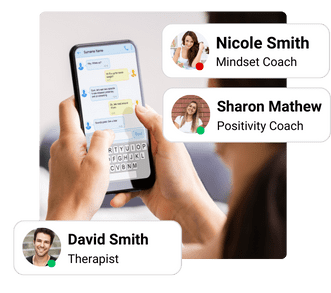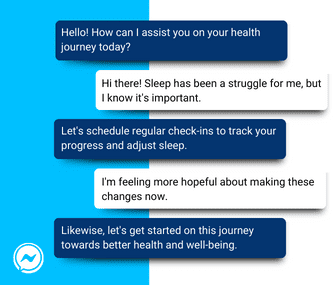
Free PTSD Counseling
Be heard by listeners and chat with others who understand your Anger. You may also talk to licensed counselors.
1000+ Listeners across the globe help you deal with PTSD
We live in a world where, we are surrounded by people, but still feel lonely. Being heard is an important part of being human. Thanks to thousands of volunteer listeners stepping up to lend a friendly ear, MindMantra is happy to say, “We’re here for you!”. It’s 100% Free.
Whether you’re navigating PTSD or other personal struggles, our listeners are keen to help. These listeners may be psychology interns, therapists, or common people who are just there to help you deal with this rough patch.
You may also choose to talk to a licensed therapist at a very affordable cost.
This is what the symptoms of PTSD can look like…
- Vivid and distressing memories of the traumatic event
- Repeated, distressing dreams of trauma
- Avoiding places, people, or activities that remind of trauma
- Feeling constantly on edge or easily startled
- Persistent negative emotions or feeling detached
- Trouble focusing or paying attention
- Increased irritability, anger outbursts, or difficulty controlling temper.
- Being overly watchful or on guard
- Headaches, gastrointestinal issues, or other physical symptoms of stress.
- Blaming oneself for the traumatic event
- Diminished sense of self-worth or self-esteem
- Pulling away from friends, family, or social situations


Why talk to a Listener?
- Listeners at My MindMantra are trained to listen actively and empathetically, offering emotional support and validation without judgment.
- Discussing your thoughts and emotions with our Listeners can help you gain clarity and perspective on issues such as anxiety, depression, stress, insomnia and other such issues.
- Through conversations with Listeners, you may discover your strengths and develop strategies to navigate difficult situations more effectively.
Read how people feel after talking to us…

Life-Changing Transformation
“My MindMantra’s counseling brought healing, clarity, and a renewed sense of purpose. Grateful for their exceptional support.”

Empathetic Guidance Works
“Through empathetic counseling, My MindMantra helped me regain control, fostering resilience and restoring hope. Invaluable support.”

Compassion in Every Session
“Experiencing My MindMantra’s compassion in counseling created a safe space, facilitating my journey towards healing and recovery.”

Global Expertise, Local Impact
“My MindMantra’s global network connects you with skilled therapists, ensuring personalized PTSD counseling with a local touch. Remarkable service.”
How it works?

Signup
Answer a few questions, and we’ll match you with a Mantra Listener that’s right for you.

Get Matched
Connect with a listener at your convenience for 1:1 virtual chat, audio, or video sessions.

Enroll with MantraCare
98% of members at MantraCare rate sessions with their Listener as amazing or life-changing.
Frequently Asked Questions
What can listeners do to help with PTSD?
Listeners provide a safe space for individuals to express their feelings and thoughts. They use active listening techniques, empathy, and non-judgmental support to help individuals navigate their anger.
How do listeners create a supportive environment for those with PTSD?
They create a supportive environment by offering empathy, understanding, and validation. They often use calming language, encourage self-expression, and provide reassurance.
Do listeners give advice or solutions?
Listeners typically avoid giving direct advice or solutions. Instead, they encourage individuals to explore their thoughts and feelings, aiding in finding their own solutions.
Is there a limit to what topics can be discussed with listeners?
Listeners are open to discussing various topics related to anger, stress, or personal challenges. However, there might be limitations, and it’s essential to adhere to the guidelines of the service.
Do listeners follow any specific approach or methodology in their support?
Listeners typically utilize active listening techniques, empathy, and non-directive approaches. They avoid judgment and aim to help individuals explore their feelings and thoughts without imposing their own beliefs or methods.